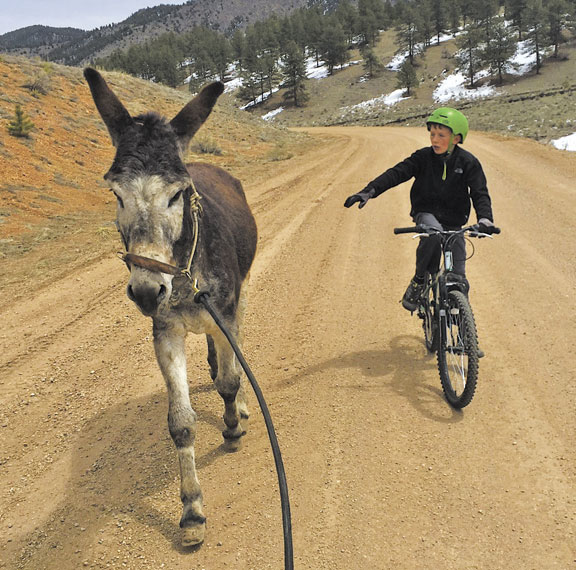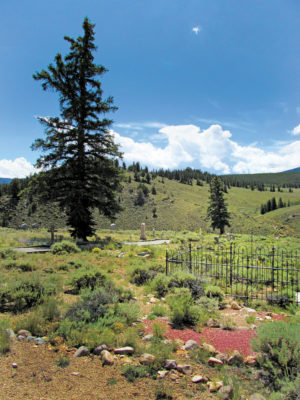I wrote in my book, Full Tilt Boogie, that for sure no burro gets up in the morning and thinks, “Dang, I think I’ll run up a 13,000-foot mountain pass today.” And likewise, no autistic kid gets up in the morning and thinks, “I think I’ll conform to societal norms today.”
I go on to explain that the real key to success with either burros or autistic children is extreme patience and allowing them to find their own way.
This past summer I entered the pack-burro racing season with a 7-year-old jack named Teddy that I’d literally liberated less than a year ago from a small corral in the middle of a San Luis Valley junk yard. Colorado’s pack-burro races are 9-29 miles in length, at high altitude, and since no riding is allowed, we run, jog and power-hike the entire distance alongside our animals, which are loaded with 33 pounds of gear. Despite my relative lack of natural ability, over the years I’ve been fortunate to have had some great success at this sport, including seven world championships, mostly by consistently showing up.
Also this past summer, my son Harrison entered his second season of running on the Custer County Middle School cross-country team. His first season I journaled in my short book, Endurance – A season in cross country with my autistic son.
The parallels between the neurodiverse mind and the animal world never cease to amaze me, and my belief in sport as a metaphor for life seems to be strengthened with age and with the challenges of raising a neurodiverse child.
One of the things I’d taken away from Harrison’s first cross-country season was that there is a delay between the time the starting gun fires and when his muscles react to it. The journey of this signal to his brain, then through his nervous system and at last to his legs seems a second or two slower than that of neurotypical kids.
It took me a long while to understand that it was not his hearing, but the way his brain translates and transmits this message. Sometimes this message is delayed, and sometimes it gets scrambled altogether.
Meanwhile, Teddy took to his training exceptionally well, and his natural speed fed my high hopes for him as the season began. In his first race at Georgetown, the gun went off and the other burros took off. He stood there for a second before seeing the other burros go. Then he started to run. In burro racing, a delay like this can make a huge difference in your overall placing. For example, such a delay can cause you to become stuck behind other teams on a narrow trail while the leaders are running away from you.
I’ve rarely seen a burro not immediately go with the herd at the start of a race. I began to wonder if Teddy just didn’t understand that the gunshot meant to go, or if he just didn’t understand what we were doing at all, or if it was a neuroprocessing issue with him as well. As the season progressed I saw this delay again in races in Fairplay, Leadville and in Buena Vista.
[InContentAdTwo]
At Leadville, Teddy and I got our cleanest start. I got a glimpse of his real potential as he ran with the leaders all through the first checkpoints, taking the lead a few times, and reaching the summit of Mosquito Pass in second place. Then he opened up a big lead on the steep descent. Finally, everything seemed to be clicking.
And then he simply quit. The leaders went by, soon followed by others in the middle of the pack. It took some while before I was able to get Teddy moving again, and by then I was headed for my worst placing at Leadville in many years.
A few weeks later I was in Beaver Creek Resort standing down-course from the starting line of Harrison’s first race of the season. After he ran by I shadowed him for a bit then saw him passing other kids. Soon he was out of sight. I turned around and backtracked the course. I felt this amazing sense of pride and accomplishment in the notion that Harrison was running his own race, and looked to be finally putting together a great effort.
In the last half mile he was running third on his five-man team. As he ran past I yelled, “Go Blur!” I chose this nickname for him not only because I know how fast he can run, but also because it also so accurately describes what I imagine to be the blurred line between his reality and everyone else’s, the blur between the social rules we all live by and his own, that shaded area between patience and humility that anyone who works with him knows so well. It also describes so very well the blur of events that goes on when things go awry with him as they so often do.
He turned and smiled and took off even faster. I waited a few moments then trailed behind hoping to get a great photo at the finish line.
As Harrison cruised in for what appeared to be the breakout/breakthrough race of his cross-country career, it all came crashing to earth. Literally. He threw himself to the ground in a tantrum just 10 yards from the finish line before a large cheering crowd. I quickly put my camera away and ran to his side to try to get him back on his feet and across the finish line. The cheering had flipped the switch in his brain.
After an intense few minutes which included his twice running away and hiding behind bushes, another visit with the turf, a lot of encouragement from his coach, myself, teammates, parents, and many others, including a nice woman who offered up her golden retriever dog to help, he finally reached the finish line by actually rolling over it sideways.
The parallel between Teddy stopping in Leadville and the Blur in Beaver Creek did not escape me. Though the situations were quite different, these two sentient beings had similar reactions, and I believe this is something primal, something rooted in self-preservation.
So what does one do after such an episode? You reach deep to find the gratitude for having been one of the co-creators of these experiences. Winning, by comparison, is easy. The process of learning and evolving is a much more difficult task. Then you ask yourself if you’re going to show up with these two beings again.
The answer, of course, is yes, we’ll keep on showing up.
Hal’s books Full Tilt Boogie and Endurance are available from The Book Haven in Salida.






I wonder what would happen if everyone were to be absolutely quiet as the Blur approached the finish line. Maybe you could precede him with a sign that says Please don’t cheer! Please be quiet! and see what happens. Would Harrison wear ear plugs? Just some thoughts, since I”ve seen him flinch with loud noise at the finish of the Kids Triathlon.